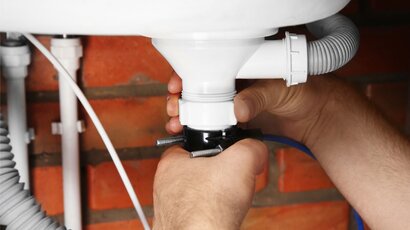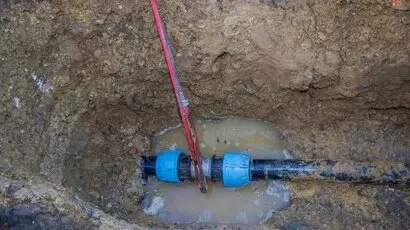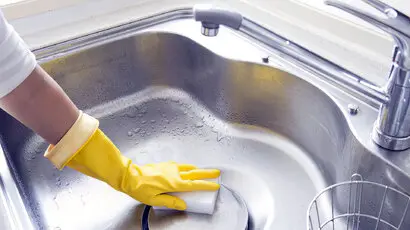How to Prevent Leaking Drains in Your Kitchen
Safeguard your kitchen from the hassle and expense of leaking drains. Our comprehensive guide provides effective strategies to prevent drain leaks and maintain a functional, hygienic kitchen environment.
Maintaining kitchen drains is crucial for every homeowner to prevent water damage, mould growth, and costly repairs. Leaking drains are a common plumbing issue that can stem from various causes, such as clogs, corrosion, or improper installation.
In this guide, we’ll dive into everything you need to know about keeping your kitchen drains leak-free. We’ll cover how your drain system works, how to spot leaks, top tips for maintenance, some DIY repair methods, and when it’s time to bring in a professional plumber.
Your kitchen’s drain system comprises the sink, garbage disposal, pipes, and traps. While the sink and disposal are on show, the pipes and traps work quietly underneath. Water and waste first go through the disposal, if you have one, and then journey through the pipes to your main sewer line or septic tank.
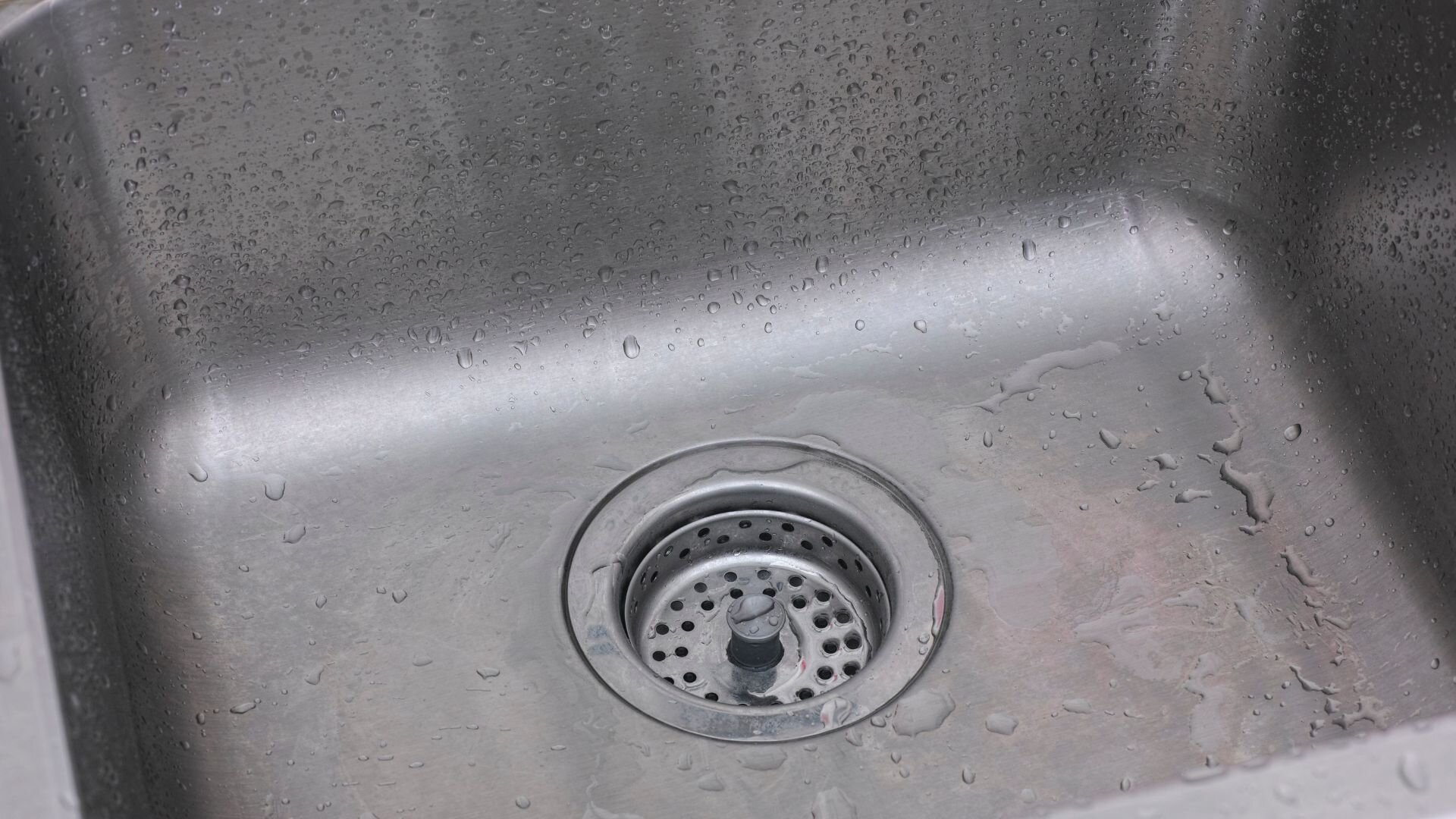
Kitchen drains rely on gravity to do their job, pushing water and waste through the pipes. Traps, usually P-shaped or U-shaped, hold a bit of water. This creates a seal to keep sewer gases from creeping back into your kitchen.
Common problem areas in kitchen drains include the garbage disposal, which can become clogged or jammed, and the drainpipes, which can develop leaks due to corrosion, loose connections, or damage from heavy objects. The traps can also become clogged with debris or lose their water seal, leading to leaks and foul odours.
Several telltale signs can indicate a leaking kitchen drain. One of the most obvious is water pooling under the sink, which can cause damage to the cabinet and flooring if left unchecked. Musty odours or visible mould growth around the sink or drain area are also strong indicators of a leak, as moisture creates an ideal environment for mould and mildew to thrive.
If you notice that your kitchen sink is draining slowly or making gurgling sounds, this may suggest a blockage or leak in the drain pipes. Lastly, visible damage to pipes or fittings, such as corrosion, cracks, or loose connections, can also point to a leaking drain that requires attention.
Follow best drain use and maintenance practices to keep your kitchen drains in optimal condition and prevent leaks.
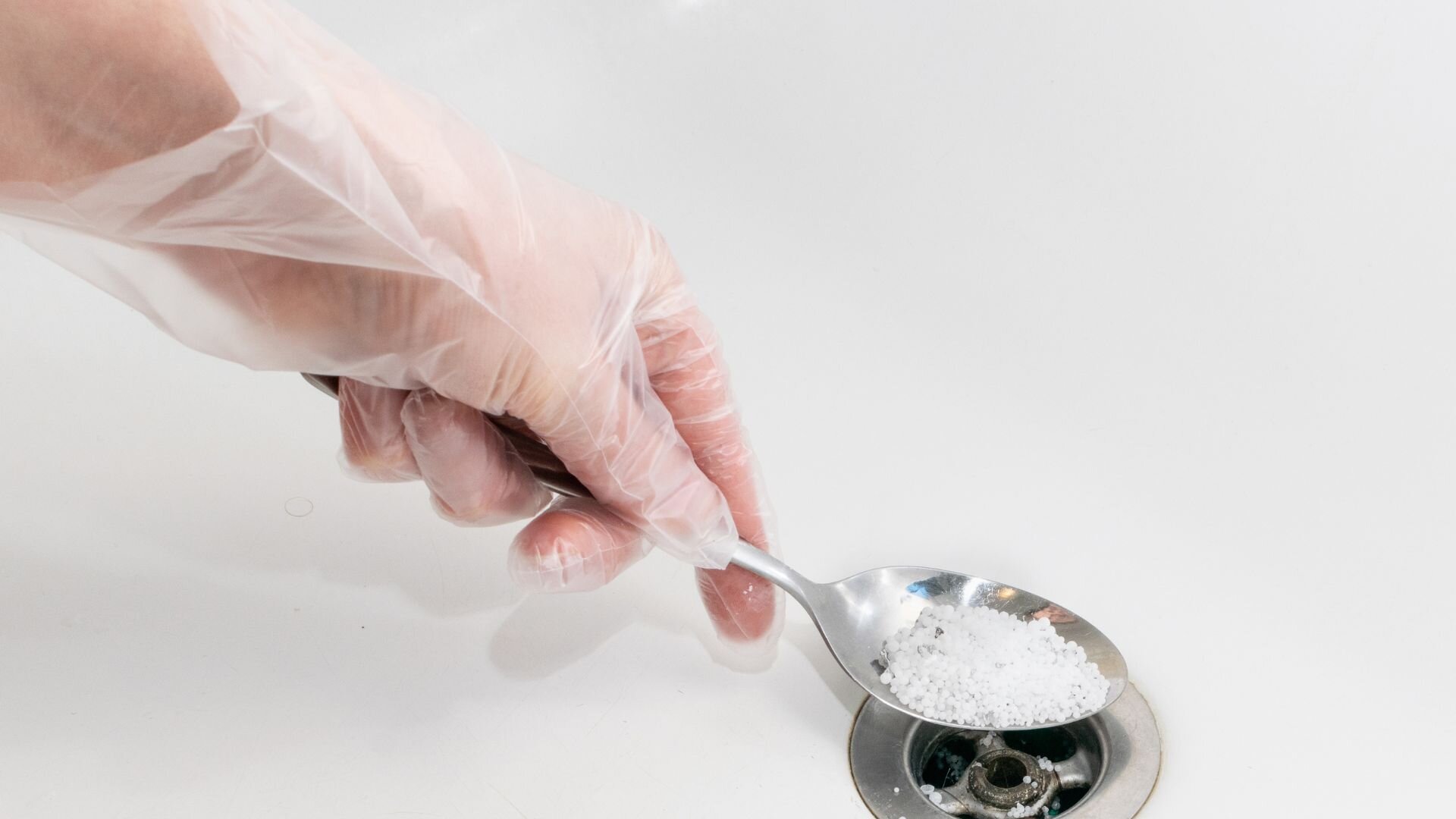
When using your garbage disposal, avoid grinding fibrous or starchy foods, such as celery, potato peels, or rice, as these can create clogs and strain the disposal. Always run cold water while using the disposal to solidify any grease and help flush debris through the drainpipes. Regularly clean and maintain your disposal by grinding ice cubes, salt, and citrus peels to remove buildup and keep the blades sharp.
Be mindful of what goes down your kitchen sink. Install mesh screens over the drain to catch food particles and prevent them from entering the drain pipes. Scrape plates and cookware into the trash before rinsing them in the sink to minimise debris entering the drain. Avoid pouring grease, oil, or fatty substances down the drain, as these can solidify and create clogs over time.
Incorporate regular cleaning and maintenance into your kitchen routine to prevent leaks and clogs. Once a week, clean your drains with a mixture of baking soda and vinegar. Pour half a cup of baking soda down the drain, followed by half a cup of white vinegar. Let the mixture sit for 30 minutes before flushing with hot water. This natural cleaner helps to remove buildup and keep your drains fresh.
Once a month, perform a deep cleaning using a plumber’s snake or drain auger to remove any debris that has accumulated further down the drain pipes. For optimal drain health, schedule an annual professional drain inspection and maintenance visit to identify and address any potential issues before they escalate into costly leaks or damage.
If you suspect a leak in your kitchen drain, you can use a few DIY methods to locate and potentially repair the issue.
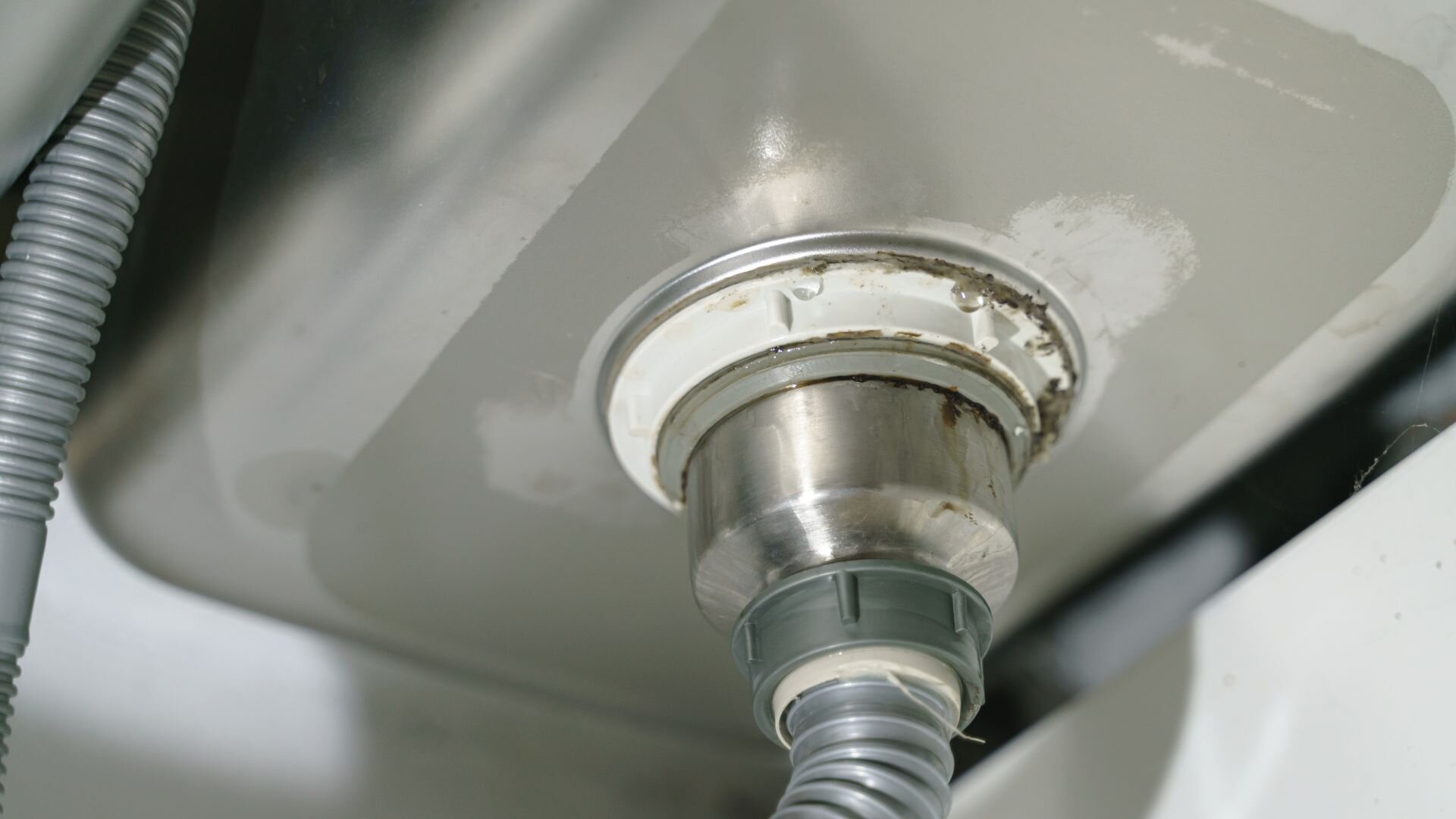
Start by visually inspecting the pipes and fittings under your kitchen sink. Look for signs of moisture, corrosion, or damage. If the leak is not immediately visible, try using food colouring to identify its source. Add a few drops of food colouring to a pitcher of water and pour it down the drain. Check the pipes and fittings for any coloured water appearing, which will indicate the location of the leak.
Should you find a minor leak from something like a loose connection or an old washer, you might fix it yourself. Use a wrench to tighten any slack connections—just don’t overdo it and cause damage. If it’s worn washers or gaskets, shut off the water, take apart the leaking piece, and swap out the worn bits for new ones.
While some minor leaks can be repaired with DIY methods, knowing when to call a professional plumber is essential. If the leak is extensive, difficult to access, or if you’re unsure about your ability to repair it safely, it’s best to contact a licensed plumber. They have the expertise and tools to diagnose and repair leaks effectively, preventing further damage to your kitchen plumbing system.
When it comes to maintaining your kitchen drains, opting for eco-friendly solutions is better for your plumbing and the environment.
Instead of relying on harsh chemical drain cleaners, which can damage your pipes and pollute waterways, use natural alternatives like baking soda and vinegar. As mentioned earlier, this combination is effective in removing buildup and keeping your drains fresh. Another eco-friendly option is enzyme-based cleaners, which use bacteria to break down organic matter and prevent clogs.
Over time, harsh chemical cleaners can wear away your pipes, causing leaks and more severe plumbing problems. They also come with health risks and can harm the environment if not disposed of properly. By opting for natural alternatives, you can keep your drains in great shape without these downsides.
Instead of pouring cooking oils and grease down the drain, collect them in a sealable container and dispose of them in the trash. You can also check with your local waste management company to see if they offer cooking oil recycling programs. Keeping these substances out of your drains prevents clogs and minimises the need for harsh cleaning products.
Consider implementing these long-term care tips to ensure your kitchen drains’ longevity and optimal performance.
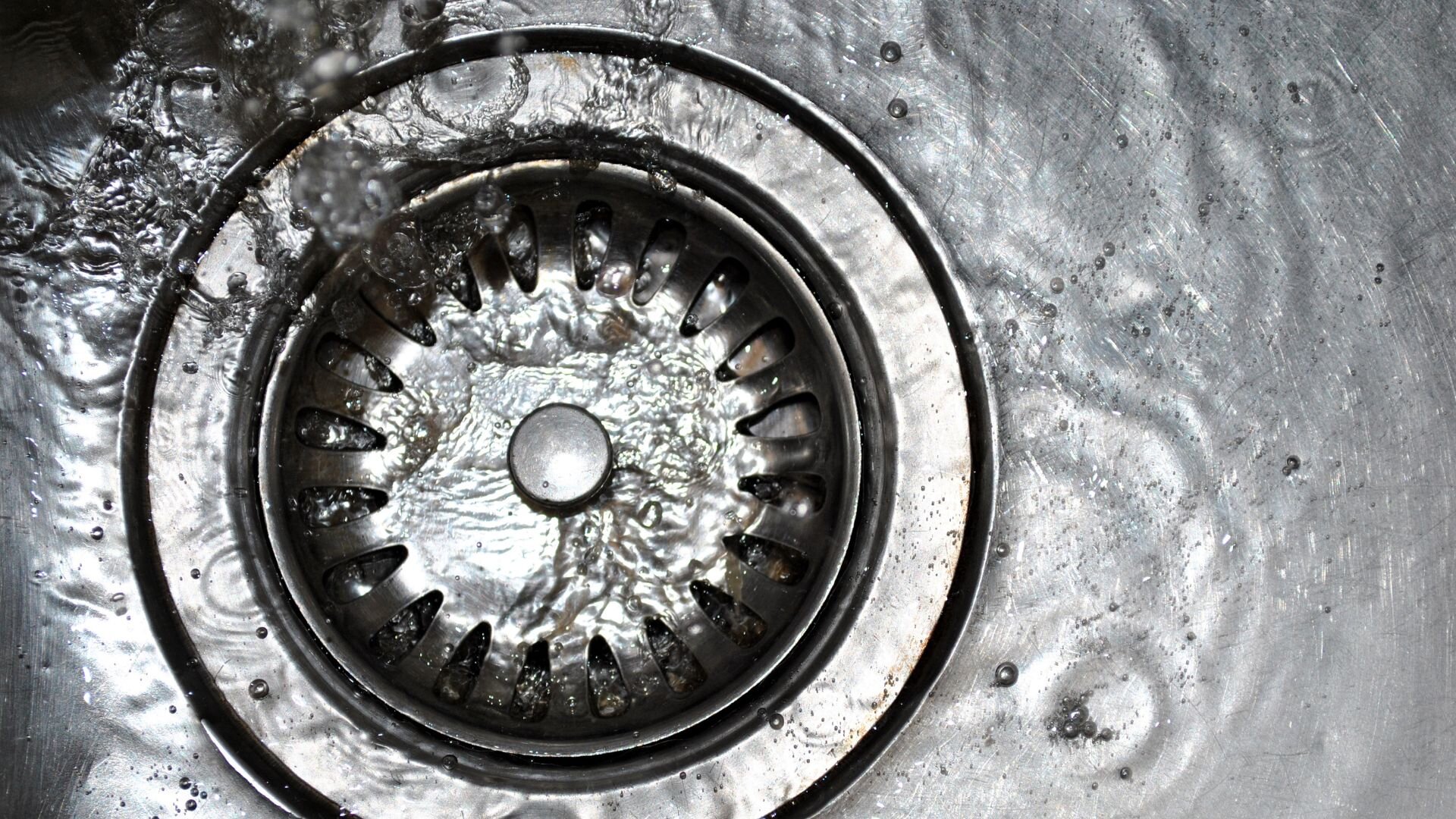
If you live in an area with hard water, installing a water softener can help prevent mineral buildup in your pipes. Hard water contains high levels of minerals like calcium and magnesium, which can accumulate inside your drains and lead to clogs and leaks. A water softener removes these minerals, protecting your plumbing system from damage.
If your kitchen plumbing is old or prone to leaks, consider upgrading to leak-resistant pipes and fittings. Modern materials like PEX (cross-linked polyethylene) and copper are durable, flexible, and less likely to develop leaks compared to older materials like galvanised steel. Investing in high-quality plumbing components can save you from costly repairs down the line.
Ensure all family members know proper drain use and maintenance practices. Teach children not to put toys or foreign objects down the drain, and remind everyone to scrape plates and avoid pouring grease or oil into the sink.
Keeping your kitchen drains leak-free is crucial for a clean and efficient home. Stick to the prevention tips we discussed, like using your garbage disposal wisely, being careful with what you wash down, routine cleaning, and eco-friendly methods. These habits will greatly lower the chance of clogs and leaks in your kitchen plumbing.
Adopting regular drain maintenance habits may take some effort initially, but the long-term benefits are well worth it. Not only will you prevent costly repairs and water damage, but you’ll also extend the lifespan of your plumbing and maintain a pleasant, odour-free kitchen environment.
If you encounter persistent leaks, clogs, or other plumbing issues you can’t resolve alone, don’t hesitate to contact WP Plumbing for professional assistance and advice. Our experienced team is here to help you keep your kitchen drains flowing freely, ensuring a leak-free and functional plumbing system for years to come.
Tired of drainage nightmares? Discover the secrets to effortlessly connecting new drains to your home’s plumbing. This comprehensive guide walks you through the process, from choosing the right fittings to ensuring proper installation. Whether you’re a DIY enthusiast or a seasoned plumber, this article is your go-to resource for flawless drain connections.
Don’t let leaking pipes ruin your day - or your wallet. With these five essential tips, homeowners can prevent plumbing mishaps and keep their pipes in top condition.
Plumbing maintenance is essential in keeping your kitchen safe and clean. This guide provides you with all the basic steps necessary to start today!
